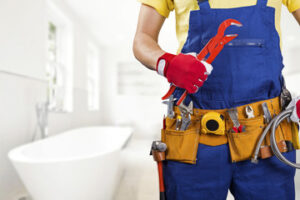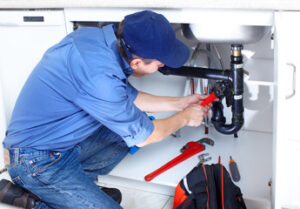Whether it’s to repair clogged drains or install water heaters, plumbing companies provide essential services to protect homes and businesses. To succeed in this industry, you need to have a clear business plan.

Start by defining your target audience and creating buyer personas to understand their needs. Afterward, choose a business structure that fits your goals, like a sole proprietorship or LLC for liability protection and flexible tax options. Contact Ranger Plumbing Company for professional help.
Whether for a new construction or remodel project, a plumbing company can help with planning and installation of plumbing systems. This involves laying pipes for the water supply, drainage, and sewer lines throughout a building. They also install fixtures, like sinks, toilets, and bathtubs for bathrooms. They may also work with kitchen appliances, such as dishwashers and refrigerators, to ensure that all the necessary plumbing parts are in place for functionality and efficiency.
Plumbing is one of the most important components of a home, providing water for drinking, washing, and cooking. A well-functioning plumbing system can also improve your home’s value and reduce energy costs. However, improperly installed plumbing can lead to leaks and clogs, which is why it is important to hire a plumber with experience and knowledge of the latest technology.
In addition to planning and installing plumbing, a plumbing company can provide repair and maintenance services for existing plumbing. These services can include fixing a leaking faucet, cleaning out drains, and removing clogs. A reputable plumbing company will offer prompt, efficient service, as well as treat customers with courtesy and respect. They will provide quality plumbing solutions that are durable and cost-effective.
A plumbing business can be run as a sole proprietorship, partnership, or corporation. The type of business structure you choose will depend on your goals and resources. If you’re not sure which structure is best for your situation, consult with a legal professional to help you select the right one for your needs.
Hiring the best employees is essential for a successful plumbing company. Look for candidates with strong customer service skills and a willingness to learn. Be sure to ask for references and perform a background check to verify qualifications. You can also use a hands-on skills test to assess candidate abilities and problem-solving capabilities.
Plumbing Repair
A plumbing company offers a wide range of repair services for water heaters, fixtures, drains, and pipes. They can handle everything from clogged drains to major leaks and sewer line repairs. These professionals also perform routine maintenance and inspections to prevent costly damage. They use state-of-the-art equipment to identify issues and make recommendations.
A plumber can work as a sole proprietor, a limited liability company (LLC), or a corporation. The structure you choose depends on the level of liability protection and tax benefits you prefer. It is important to research your options and register your business before starting operations. You will need to obtain a license from the city and state where you plan to operate, as well as a business permit from your local municipality.
It is common for homes to experience minor plumbing problems from time to time. However, if these issues are left unattended, they can become more serious and lead to expensive repairs. This is why it is important to hire a professional plumber who can provide timely and efficient plumbing repairs.
When hiring a plumber, be sure to ask about their training and certifications. You can also ask for references from past clients to get an idea of their work quality. Also, check whether the plumber is licensed and insured.
Leaking pipes are a huge problem for homeowners, as they can cause extensive water damage to floors and walls. In addition, the presence of standing water can attract dangerous pests like rats and mosquitoes. To avoid these problems, it is essential to hire a plumber who can conduct a thorough inspection of your home’s plumbing and repair any issues.
The plumbers who work at a plumbing company are highly skilled and trained. They can detect even the smallest problems and fix them before they become worse. In addition, they can provide valuable advice on how to maintain your plumbing system and extend its life.
Plumbing is a complex and important aspect of any household or commercial building. It is vital to keep the pipes and fixtures in good condition to ensure that the building has sufficient supply of fresh water and can dispose of wastewater in a safe manner. Professional plumbers can help you protect your investment by providing high-quality services at competitive prices.
Plumbing Maintenance
Plumbing maintenance involves identifying and addressing issues with the pipes, fixtures, and appliances in your home or building. It also helps prevent leaks and minimizes water wastage. Regular maintenance services can save you money in the long run by preventing damage to your property and extending the life of your plumbing system.
Performing routine inspections of your plumbing system helps detect problems such as leaks and clogs. It also ensures that your plumbing is functioning properly, which can save you money on utility bills and water damage. Regular maintenance can also help you prevent issues like pipe corrosion and extend the lifespan of your plumbing system.
Leaky faucets and running toilets are major sources of water wastage, which can lead to inflated utility bills. Moreover, these issues can cause serious damage to the plumbing system and reduce your property value. However, plumbing maintenance can identify and repair these problems before they escalate into expensive emergencies.
Regular plumbing maintenance can help prevent clogs by cleaning and maintaining the drains and preventing debris from entering the sewer lines. It can also help prevent problems with your sewer line by detecting and repairing issues such as cracks or blockages. In addition, plumbing maintenance can help protect your property from external factors such as freezing temperatures and hard water by insulating pipes and installing water softeners.
A well-maintained plumbing system is essential to your home or business. It provides clean water for consumption and eliminates waste water through drainage systems. Performing routine maintenance on your plumbing system can help you save money on energy costs and keep your family or employees healthy and safe.
One of the main causes of sewer backups is clogs, which can be caused by food scraps, paper towels, and other items that are flushed down the drains. Regular maintenance can help prevent clogs by removing grease and other buildup from the drains. It is important to educate everyone in your facility about what can and cannot be flushed down the drains. Clear signage above sinks and toilets can be an effective reminder, along with obvious alternative garbage disposal units.
Plumbing Design
Plumbing design services involve planning and installing various water supply systems, drainage systems, and sewer lines for residential and commercial properties. These systems are vital to ensuring that drinking water is clean and safe, and that waste is removed effectively.
Effective plumbing design involves a thorough understanding of hydraulic principles, building codes, and sustainable practices. It includes planning the layout of pipes, calculating pipe sizes, and selecting fixtures and appliances. It also entails minimizing piping runs to reduce cost and ensure efficiency. Plumbing engineers often work in collaboration with mechanical and civil engineers to create plumbing systems that meet the needs of a new building.
In addition to their expertise in planning, plumbing designers must be familiar with a variety of software programs to assist with project management, calculations, and review. These include AutoCAD, Revit MEP, and Navisworks. They should also have a solid grasp of plumbing concepts and be able to identify potential problems, such as water and gas leaks, before they occur.
A well-designed plumbing system contributes to a healthy, comfortable, and efficient home or business. It ensures that the building has a sufficient supply of clean water, prevents waste from backing up in drainpipes, and reduces energy consumption through effective water conservation. It can also help minimize environmental impacts through the use of low-flow fixtures and water-saving appliances.
To become a plumbing designer, you will need a bachelor’s degree in mechanical engineering or a related field and relevant experience. While a bachelor’s degree is not required for every job, it can improve your career opportunities and help you acquire the skills necessary to advance in the industry. In addition, you can also pursue professional certifications to show your commitment to excellence. These credentials can include a Green Plumbers USA Certification, which focuses on sustainability and eco-friendly technologies, or a Master Plumbing Engineer License.
Once you have the qualifications and resources to start your own plumbing design firm, it’s time to establish a legal structure. Your options include a sole proprietorship, limited liability company (LLC), or corporation. Each type has its own set of advantages and disadvantages. A sole proprietorship is easy to set up, but it puts your personal assets at risk for any liabilities or debts the firm incurs. A LLC offers liability protection but is more complex to maintain and requires additional paperwork. A corporation provides robust liability protection, but it’s more difficult to open new branches and hire employees.
